As a professional in the learning & training industry, I always love exploring the best learning solutions. That’s why I chose EdApp, which seemed to offer many features and benefits like microlearning, mobile-first approach, advanced analytics, etc.
However, after using EdApp for a while, I realized that it was not the right choice for me. Here are some of the reasons why I decided to look for EdApp alternatives:
- EdApp pricing was not very transparent, and I had to pay extra for some premium features that were essential for my training needs. For example, I had to upgrade to access advanced analytics, custom branding, and integrations.
- EdApp reviews were not very positive, and I found out that many users had similar complaints and frustrations. Some of the common issues were poor customer support, frequent downtime, and lack of updates.
- The tool did not support offline learning, video streaming, or interactive elements. Also, some of my courses did not load properly or got corrupted.
That’s why I decided to explore other options and compare them with EdApp. In this blog post, I will share my experience and findings with you.
List of the Top EdApp Alternatives
I’ve compiled this list by drawing on my personal experiences, reliable software directories, suggestions from colleagues, and feedback from satisfied customers.
1. ProProfs Training Maker – Best for Employee Training on Mobile
I find ProProfs Training Maker to be a viable alternative to EdApp. It’s a mobile LMS that enables learning on the go, catering to modern employees who prefer flexibility and convenience. The courses you create with the LMS work great on mobile, tablet, and desktop, enabling anytime, anywhere learning.
Users can access learning materials at their fingertips, leading to better information retention. Plus, learners can conveniently view assignments, notifications, and certifications on their mobile devices.
For me, its ease of use and compatibility with various devices, including Android, iOS, Windows, and Mac, sets it apart. It supports various content formats and lets you send quizzes or courses by phone number, email, or ID. You need to download and share a unique QR code that invites learners to take the quiz/course on their mobile devices. You can also use the link option to send the quiz/course link via chat or SMS.
ProProfs Training Maker simplifies learner management by allowing you to set automatic expiration dates for inactive accounts. This feature aids in maintaining an updated user record while saving time. It can be handy in scenarios where access to a course needs to be restricted after a certain period or limited to new users in a specific classroom.
Industries such as retail with high employee churn can benefit from it as they can simply pause or mark an employee as inactive and use that slot to train a new person.
The LMS analytics and reporting features provide invaluable insights into our employees’ progress. You can generate location, group, and department-based reports. This feature allows for streamlined learner management and performance analysis, empowering organizations to gain valuable insights into training outcomes and compliance.
What You Will Like:
- A user-friendly platform, even for beginners with no prior experience in creating online training content
- Learning paths to arrange courses in a logical order for better understanding
- Surveys to collect actionable feedback and make necessary improvements to your training programs
What You May Not Like:
- The free plan does not include premium courses.
- The software is frequently updated, which may require you to make adjustments occasionally.
Pricing:
FREE for up to 10 learners. Plans start at $1.99/learner/month for 10+ users. Unlimited courses. Unlimited admins. No hidden fees. A 15-day money-back guarantee.
Looking for a fully customizable LMS?
Try ProProfs Training Maker today for free.
2. iSpring Learn – Best for Microlearning
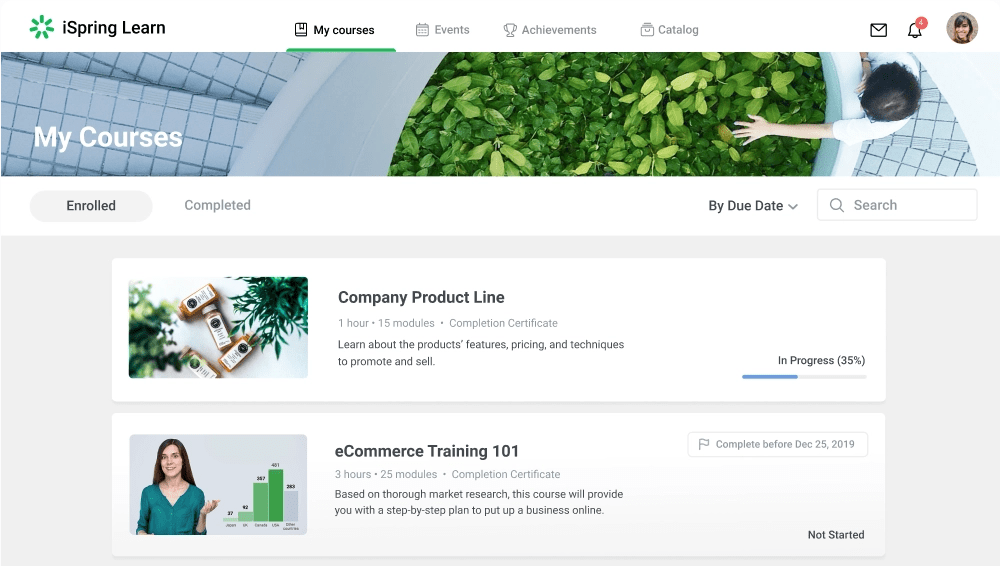
Another alternative to EdApp is iSpring Learn LMS, which offers a robust platform for microlearning, delivering training in bite-sized courses designed for quick, engaging learning. With a user-friendly authoring toolkit, it’s easy to create content from various sources, including videos and articles.
The platform supports video lectures, dialog simulations, quizzes, and surveys, making learning interactive and comprehensive. It ensures accessibility on all devices, including offline learning, targeted training for specific employee groups, and full automation for timely notifications.
The incorporation of gamification elements like leaderboards, badges, and certificates keeps learners motivated. With a seamless interface, dedicated support, and flexible pricing, iSpring Learn LMS simplifies the microlearning experience for both creators and learners.
What You Will Like:
- Supports various types of content, such as SCORM, xAPI, HTML5, PDF, MP4, and more.
- Has a learner portal that gives your learners access to their courses, progress, certificates, and feedback.
- It has mobile apps for iOS and Android that allow your learners to access their courses offline and sync their progress when online.
What You May Not Like:
- Lacks a gamification feature that allows you to add badges, points, and leaderboards to motivate your learners.
- It does not have a social learning feature that allows your learners to interact with each other and share their knowledge.
Pricing:
Starts at $770/author/year.
3. Docebo – Best for Enterprise Learning
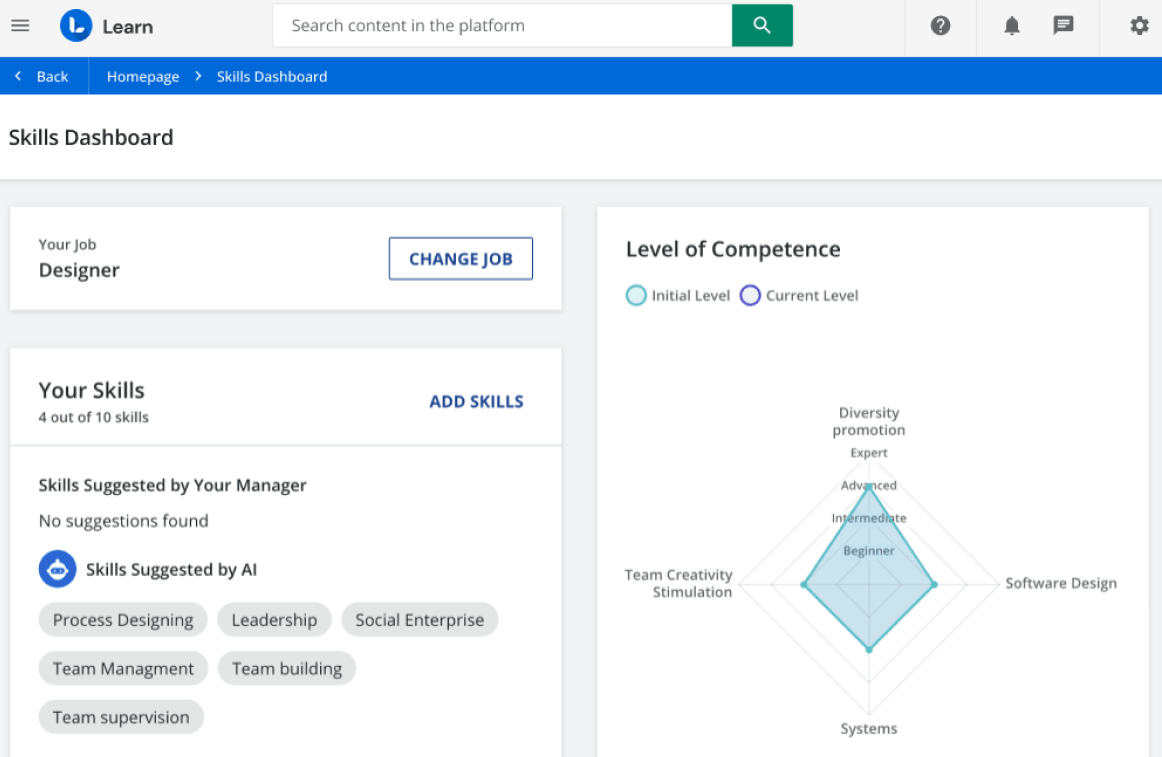
Docebo employs artificial intelligence to enhance the enterprise learning experience, from onboarding to talent management and compliance training. I particularly appreciate the virtual coach feature that assists learners by offering guidance, recommending content, monitoring progress, answering queries, and sending reminders.
Docebo excels in managing multiple domains for diverse audiences with customized branding and authentication. The content organization and AI integration streamline enterprise learning, saving valuable time and improving the learner experience.
Docebo’s commitment to audience privacy and Single Sign-On enhances security and accessibility for enterprise users. Delegating admin rights and custom reporting empower efficient management and measurement of enterprise learning programs.
Plus, it effectively prepares organizations for a mobile-first learning future, providing a user-friendly and flexible experience. The platform offers access to learning content on smartphones, ensuring learners can access information when they need it, wherever they are. The ability for learners to create instructional videos with their mobile devices promotes interactive and experiential learning.
What You Will Like:
- An easy-to-navigate user interface featuring drag-and-drop construction tools
- Multilingual support for training a diverse, worldwide audience
- A streamlined and user-friendly integration procedure
What You May Not Like:
- Geared towards enterprise-level clients seeking scalability and customization
- Limited availability of documentation, tutorials, and guides for platform utilization.
Pricing:
Paid plans start from $25,000/year.
4. 360Learning – Best for Collaborative Learning
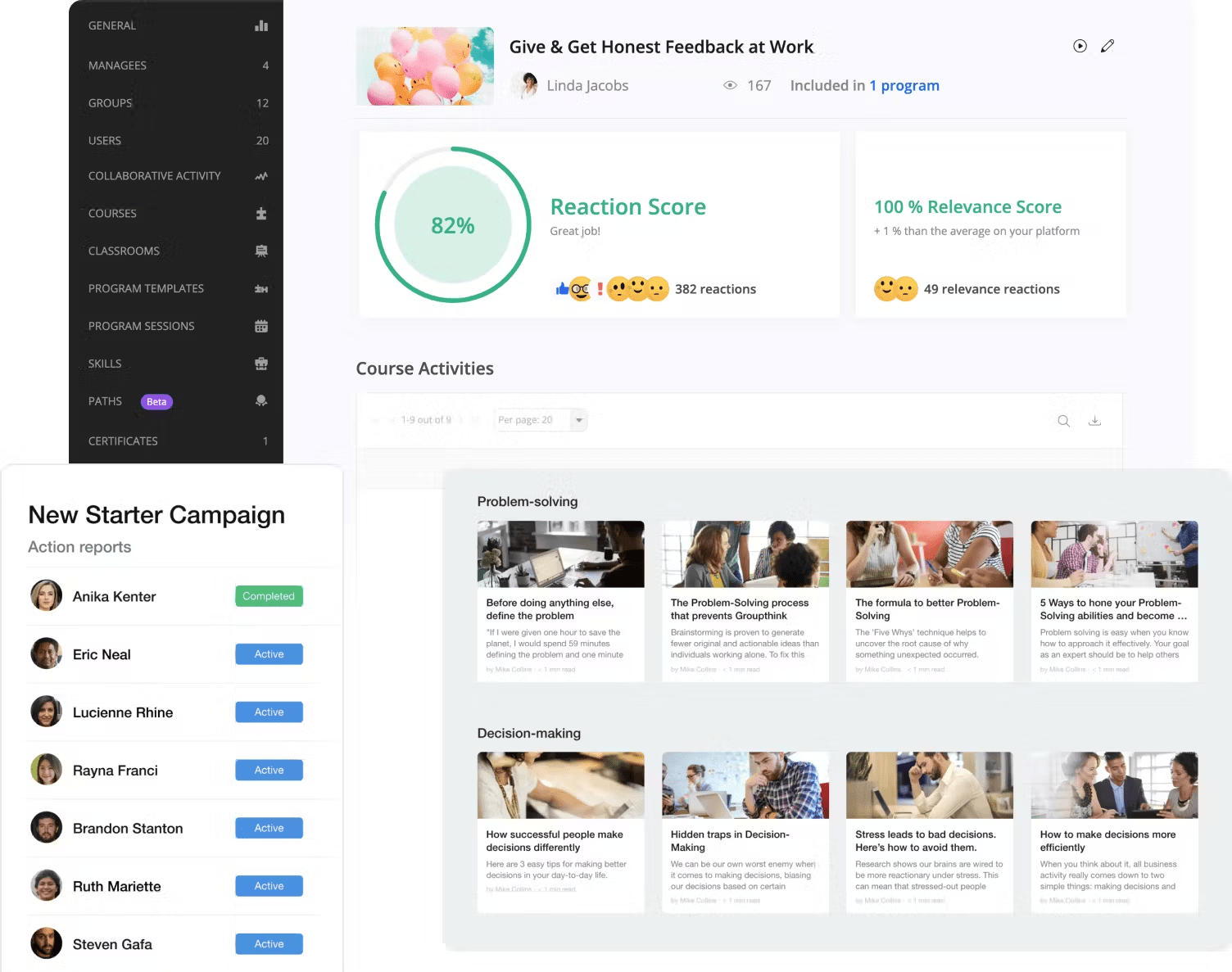
I’d recommend 360Learning as another compelling alternative to EdApp for collaborative learning. This platform offers an interactive and captivating method for delivering training and educational materials. Users can effortlessly develop and distribute courses, monitor learner advancement, and encourage the exchange of knowledge among participants.
The user-friendly interface simplifies the process of generating practical and quantifiable learning resources. Furthermore, it offers readily available training content, which reduces the time and effort typically associated with traditional classroom-style training.
Distinguishing itself from conventional LMS, 360Learning fosters peer-to-peer learning and the sharing of knowledge, making it a great fit for organizations that emphasize teamwork and community-driven learning experiences.
What You Will Like:
- Promotes active engagement and the sharing of knowledge
- Offers user-friendly tools for creating and managing courses, simplifying content creation and organization
- Provides comprehensive analytics and reporting capabilities that offer valuable insights into learner progress and course efficacy
What You May Not Like:
- Certain advanced features may need additional customization or integration with other tools
- Users who are not accustomed to modern LMS interfaces may encounter a slightly steeper learning curve when navigating the platform
Pricing:
Paid plans start from $8/user/month.
5. Seismic Learning – Best for Learning & Coaching
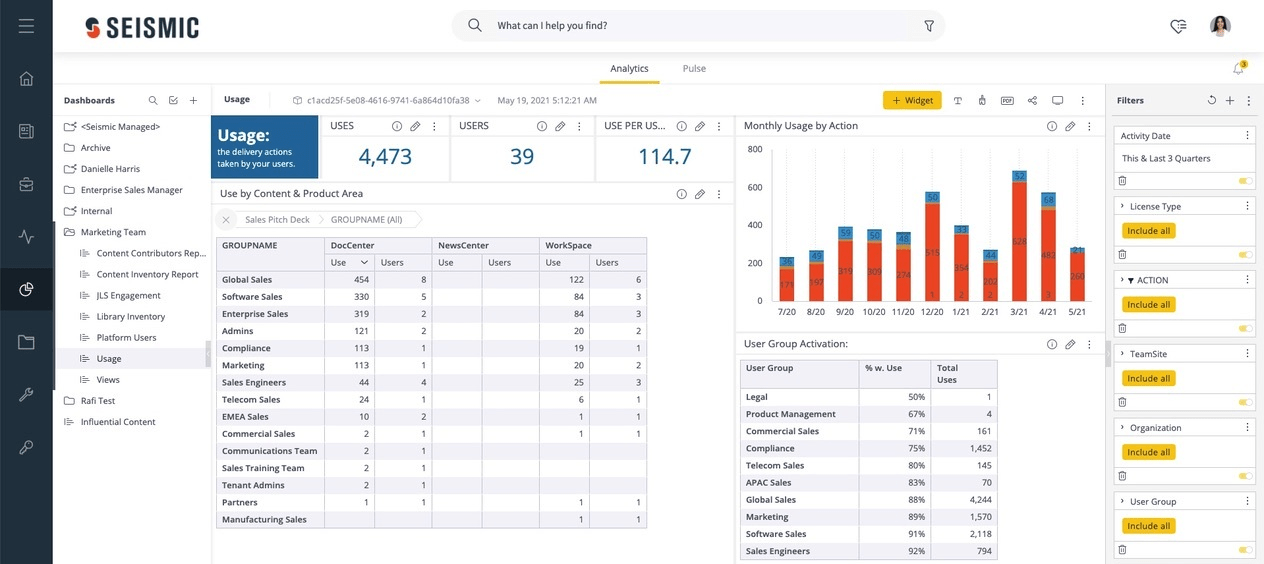
Seismic stands out as a compelling choice due to its emphasis on active participation and knowledge exchange, creating an engaging learning atmosphere. It encourages learners to be more involved and share their insights, fostering a dynamic educational experience.
Moreover, Seismic’s intuitive course creation and management tools make it exceptionally user-friendly, allowing users to easily craft and organize content without encountering any major hurdles. This ease of use ensures a smooth learning process for both beginners and experienced users.
Seismic provides robust analytics and reporting features, delivering valuable insights into learner performance and course effectiveness. This data-driven approach empowers educators and administrators to continually improve their training content and adapt to the needs of their audience.
What You Will Like:
- Has a drag-and-drop interface for creating engaging content.
- It supports blended learning and instructor-led training, as well as self-paced learning.
- Has features for measuring the impact of training on business outcomes, such as revenue, retention, and customer satisfaction.
What You May Not Like:
- Mainly focused on client-facing skills, such as sales and customer service, and may not be suitable for other types of training needs
- Lacks some of the advanced features like gamification, certification, or compliance that some other LMS offer
Pricing:
Custom pricing.
6. Thinkific – Best for Branded Mobile App
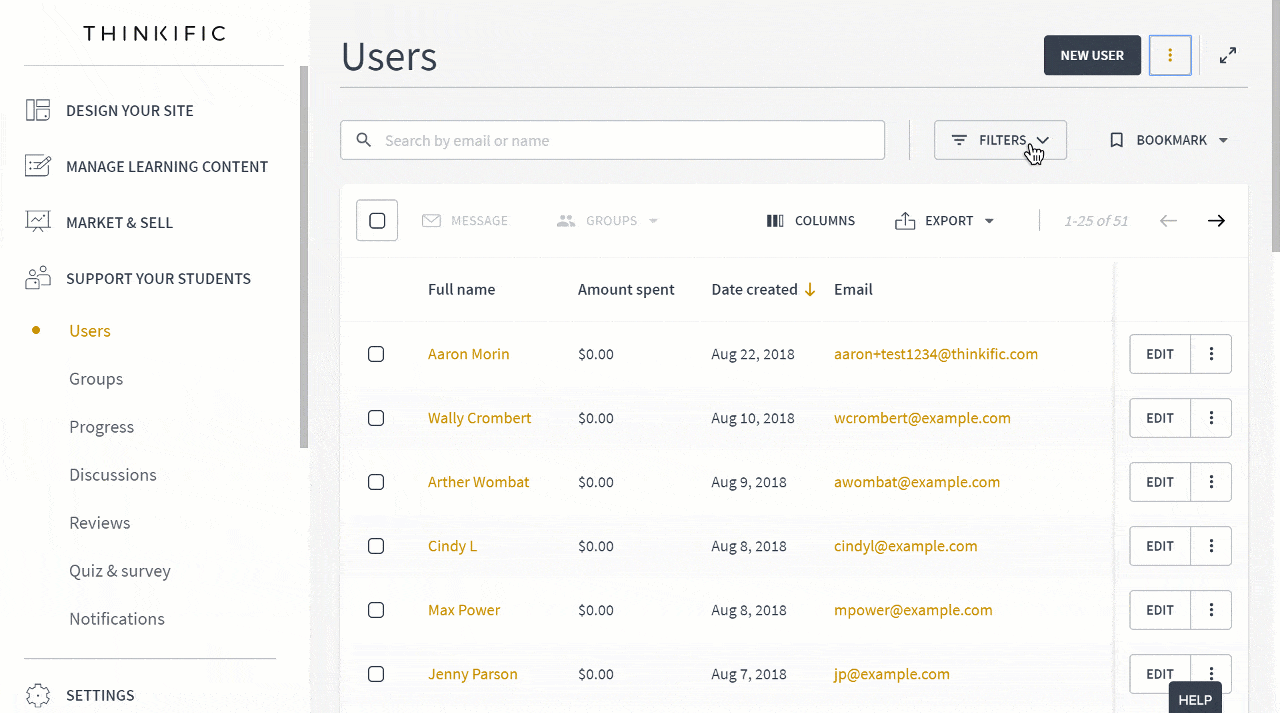
Thinkific offers a custom-branded mobile app that perfectly aligns with your business identity, a crucial asset in today’s digital landscape, where many learners prefer mobile devices.
What I find most appealing is the ability to personalize the app store listing, ensuring that your brand takes center stage. This is complemented by features like push notifications, on-the-go access, and activity feeds that maintain engagement and connectivity, creating a seamless learning experience.
Furthermore, the in-app purchase feature is a game-changer, enabling your audience to conveniently acquire additional courses without leaving the app, ultimately driving more revenue.
If you’re looking to elevate your online courses and communities with a tailored mobile app, Thinkific’s Branded Mobile is the optimal choice.
What You Will Like:
- Provides flexible pricing plans to accommodate diverse budgets and business needs
- Equips users with robust course creation tools, allowing for customizable learning experiences
- Offers a wide selection of integrations with third-party applications, including automation capabilities through tools like Zapier
What You May Not Like:
- Lacks an integrated sales funnel builder for creating landing pages, upsells, and downsells
- Thinkific lacks a centralized platform for potential students to explore and find your courses
Pricing:
Free plan available (limited to one course). Paid plans start at $36/month. Five spaces per community.
Which EdApp Alternative Should You Choose?
Choosing the right EdApp alternative can be challenging, and I agree with that.
Several factors, including features, usability, scalability, support, and pricing, need careful consideration. As someone who has explored various alternatives, I can attest to the importance of finding the one that aligns with your goals and preferences.
Based on my experience, I’d recommend the following three options as the best EdApp competitors:
Option A: ProProfs Training Maker
This versatile and user-friendly platform offers a wide array of features for creating and delivering engaging online courses. It includes a virtual classroom, personalized learning paths, and comprehensive reporting, making it an excellent choice for employee training and professional development.
Option B: Absorb LMS
A learner-centric platform that prioritizes interactive and collaborative learning experiences. It features Absorb Engage, leaderboards, badge systems, and custom course design, enhancing learner engagement and motivation.
Option C: Docebo
I find this AI-driven platform particularly appealing for its ability to personalize the learning experience. With features like content recommendations, real-time feedback, and predictive analytics, it excels in adaptive learning and data-driven decision-making.
In my view, ProProfs Training Maker emerges as the top choice among these options. It offers all the essential tools to create and deliver high-quality training courses for employees. Its user-friendliness, flexibility, and affordability make it a valuable asset for improving learning outcomes and learner satisfaction.
 Tips
Tips
We’d love to hear your tips & suggestions on this article!
Get Free LMS Software — All Features, Forever.
We've helped 567 companies train 200,000+ employees. Create courses in under a minute with our AI LMS or use 200+ ready-made courses on compliance, harassment, DEI, onboarding, and more!

 We'd love your feedback!
We'd love your feedback! Thanks for your feedback!
Thanks for your feedback!







